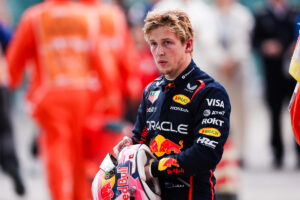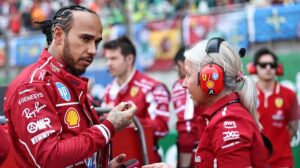JUST IN: F1 team banned from using of… at Dutch Grand Prix as new… Read More

F1 team banned from using of… at Dutch Grand Prix as new… Read More
In a significant development for this weekend’s Dutch Grand Prix at Zandvoort, the Stake F1 team has been hit with a branding ban by Dutch authorities. The Switzerland-based Sauber team, which partnered with international gambling company Stake following the conclusion of Alfa Romeo’s sponsorship, will be unable to use its official name during the race. Despite betting advertising being legal in the Netherlands, Stake’s operations do not comply with the country’s gaming regulations, forcing the team to rebrand temporarily as “Kick Sauber.”
The conflict stems from the fact that Stake lacks a local operating license in the Netherlands. The Kansspelautoriteit (Ksa), the Dutch Gaming Authority, has raised concerns over the team’s branding. Without the required license and the potential for Dutch residents to access Stake’s services, the Ksa has made it clear that the company cannot promote its brand during the Grand Prix.
In a statement, the Ksa explained, “The Sauber Formula 1 team competes in most international races as the ‘Stake F1 Team.’ Stake is an international gambling provider and the main sponsor of the team. However, Stake does not have a license from the Ksa and is therefore not allowed to offer gambling services in the Netherlands.”
This move is part of a broader crackdown by the Dutch authorities to ensure regulatory compliance within the gambling sector. The Ksa highlighted that under Dutch gambling laws, it is illegal to offer games of chance without a license, advertise these illegal gambling services, or promote participation in them. As a result, online gambling providers like Stake, which do not hold a Dutch license, must take steps to prevent access from Dutch players, including using geoblocks to restrict website access from within the country.
“Stake has applied such a geoblock,” the Ksa acknowledged, “but despite these measures, the Ksa still sees participation by Dutch players. The Ksa, therefore, finds it undesirable that illegal gambling is advertised at a Dutch event with the global reach and size of Formula 1.”
This issue is particularly concerning given the wide appeal of Formula 1, which draws a significant number of younger viewers. The Ksa voiced its concerns about the impact of such advertising on vulnerable groups, including minors and young adults. “Because the event attracts a lot of attention among vulnerable groups, the board of the Ksa has urgently requested both Sauber and the organizers of the Dutch Grand Prix to refrain from racing under the Stake name and from promoting this provider,” the Ksa stated.
This is not the first time that Sauber has faced restrictions on using the Stake brand. Earlier this year, the team was forced to compete under different names at several other Grand Prix events, including in Australia, Spain, and Belgium, due to local laws that prohibit the promotion of gambling companies.
The Ksa’s move reflects a growing trend of countries tightening regulations around gambling advertising, particularly in connection with major sporting events that attract younger and potentially vulnerable audiences. This also comes amid broader efforts in Europe to limit the influence of gambling companies in sports, as concerns about addiction and its impact on society continue to grow.
The restrictions in the Netherlands are part of a wider challenge for Stake as it navigates a complex regulatory landscape in Formula 1’s global calendar. The team is also expected to face similar advertising restrictions in other jurisdictions, including Qatar, which hosts the penultimate race of the season. Like the Netherlands, Qatar has strict regulations on gambling advertising, meaning that Stake’s branding will once again have to stay off the racing tracks.
For Stake, these repeated rebranding efforts are an inconvenience that underscores the challenges faced by companies in highly regulated industries trying to expand their global footprint through sports sponsorship. The company’s two-year contract with Sauber grants it naming rights, but this arrangement is temporary and will expire when Sauber transitions into a factory team for Audi in 2026. This transition will mark Audi’s much-anticipated entry into Formula 1, but until then, Sauber must navigate these regulatory hurdles.
As the Dutch Grand Prix approaches, the focus will be on how the Sauber team adjusts to the forced rebranding and the impact this may have on its commercial partnerships. While the on-track action will remain the centerpiece of the weekend, the clash between gambling regulations and international sports sponsorship provides a significant backdrop to the event.
For fans, this also raises questions about the future of sponsorship deals in Formula 1, particularly as the sport continues to expand into new markets with varying regulatory environments. The combination of local laws, public health concerns, and the global nature of the sport will continue to present challenges for teams and sponsors alike.
As the Dutch Grand Prix at Zandvoort kicks off, the Sauber F1 team will compete under the name “Kick Sauber,” following the Dutch Gaming Authority’s insistence on banning Stake’s branding. This situation reflects a broader trend of increasing regulatory scrutiny over gambling advertising in sports, a development that will likely continue to impact Formula 1 teams and sponsors in the future. The sport’s expansion into different global markets will require careful navigation of local laws and regulations, particularly in industries as tightly regulated as gambling. As Sauber looks ahead to its future with Audi, it will have to continue managing these challenges while maintaining its performance on the track.





